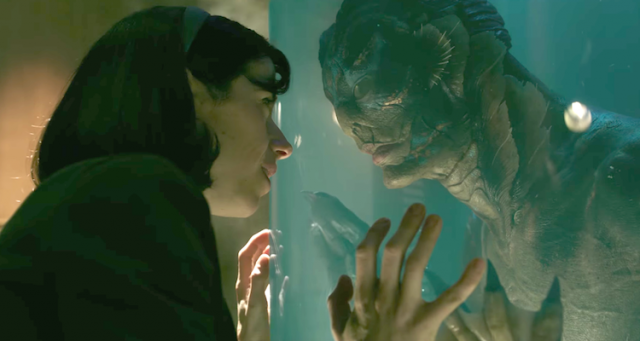
Like many fairy tales, “The Shape of Water” is a fantastical story about a lonely person who finds fulfillment through interaction with a magical creature. Unlike most fairy tales, “The Shape of Water” lets its sex, violence, and cruelty fall out casually, no sugarcoating. You’re being charmed by the “Amelie”-like musical score and the whimsical characters when oh, hey, there’s Michael Shannon being very gross while having relations with his wife.
Anyone who saw “Pan’s Labyrinth” won’t be surprised to learn that its maker, the mischievous Mexican maestro Guillermo del Toro, is also behind “The Shape of Water” (sharing screenplay credit with Vanessa Taylor), his 10th feature and approximately the 10th to have macabre, gothic themes, beautiful imagery, and a dark sense of humor.
And yes, it’s about a woman who befriends a fish-man.
The woman is Elisa (Sally Hawkins), mute since birth (or thereabouts) but able to hear, sign, and love. She lives above a Baltimore movie theater in 1962, across the hall from Giles (Richard Jenkins), an older, gay freelance commercial illustrator whose loneliness mirrors hers. (Just about everyone in this story is lonely.) They watch old musicals on TV and tap along with the dancing, almost like a father and daughter.
Elisa, who dreams of watery adventures and was found near a river as an orphan baby, works on the overnight cleaning crew at a government research facility alongside Zelda (Octavia Spencer), a chatterbox who, like Giles, is fluent in understanding Elisa’s sign language. Elisa and Zelda are on the clock when a new “asset” arrives accompanied by one Mr. Strickland (Michael Shannon), the government functionary who found it and brought it here from South America. The asset is an amphibious man-like creature (played by Doug Jones) with sharp teeth and claws, kept chained in a tank so he can be studied and eventually dissected.
Strickland and his five-star boss, Gen. Hoyt (Nick Searcy), view the creature as nothing more than a tool to help us beat the Soviets (and you better believe the Soviets are after this thing too). Strickland, narrow-minded and racist, tells Elisa and Zelda that it’s an “affront,” an aberration that wasn’t “created in the Lord’s image” like we were (well, like white people were), that is has no feelings or emotions. Elisa comes to believe otherwise, as does Dr. Hoffstetler (Michael Stuhlbarg), a scientist who witnesses the fish-man’s cognitive abilities.
Del Toro’s story has multiple angles, then: Elisa befriending fish-man; the Soviets trying to get him (or at least stop the Americans from having him); Elisa and Hoffstetler trying to save him before Strickland and Hoyt “crack the damn thing open, learn what you can, and close shop.” Strickland emerges as a true fairy tale ogre, a lewd, controlling villain who enjoys afflicting the fish-man with his cattle prod, which he calls an “Alabama howdy-do.” (You must admit, that’s a very good name for a cattle prod.) It’s a “Beauty and the Beast” situation, including the eternal question of who’s the real monster here. Michael Shannon plays the role with fearsome malevolence.
But our primary concern is kind, meek Elisa and her amphibious companion, unspeaking misfits who make a connection in a world where so many are excluded because of their sexuality, race, or biological class. Baltimore’s racial tensions play out in the background; the Cuban Missile Crisis looms — but here are two souls finding tranquility in the peaceful seas beneath the choppy surface, metaphorically speaking. Sally Hawkins’ gentle plainness always makes her sympathetic, more so when she plays someone with a disadvantage that makes us want to protect her. Doug Jones, who’s played demons, ghouls, and other makeup- or CGI-intensive entities in a couple dozen movies (he was the Pale Man in “Pan’s Labyrinth”), has become expert at conveying emotion and humanity through his body language, unhindered by whatever latex or pixels are superimposed over his face. Elisa and the amphibian man’s sweet, unorthodox relationship reminds the other characters and us that there’s someone out there for everyone.
A- (2 hrs., 3 min.; )





